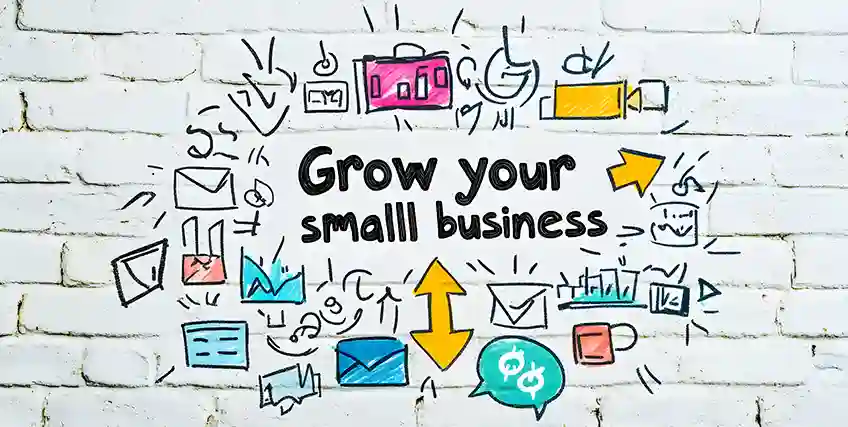A Beginner’s Guide to Small Business Marketing
May 05, 2025 | Last Updated on: May 05, 2025

Marketing is the lifeblood of any business, and for small businesses, it's often the key to survival and growth. In a competitive marketplace, companies need to employ effective marketing strategies to reach their target audience, build brand awareness, and drive sales. In this article, we’ll explore some marketing topics that every small business owner should be familiar with:
- Identifying and Understanding Your Target Audience
- Social Media Marketing
- Email Marketing and Newsletters
- Paid Digital Advertising
- Customer Reviews

1. Identifying and Understanding Your Target Audience
This is the foundation of all successful marketing. Without a clear understanding of your potential customers and their pain points, you’re essentially just guessing at what they want, and how your products and services will meet their needs.
Marketing at its core is nothing more than showing potential customers how what you’re selling meets their needs.
But you can’t do this if you don’t know what they need.
So, start by creating detailed buyer personas. These are semi-fictional representations of your ideal customers, based on market research and real data. Identify their demographics, interests, pain points, and buying behaviors.
When you know and understand your audience intimately, you can tailor your marketing messages, content, and channels to resonate with them. This leads to higher engagement and conversion rates, since personalized marketing connects with customers on a deeper level. When your audience feels understood, they are more likely to trust your brand and make purchases.
For instance, a plumbing service provider may focus on homeowners aged 30-60 who often require home maintenance. They’ll target their marketing towards people in this demographic group, since these are the individuals who are the most likely to spend money on their services. Nothing goes to waste!
If you’re able to accurately identify the target audience, you can expect improved return on investment (ROI), increased customer loyalty, and higher conversion rates.
2. Social Media Marketing
Social media is an indispensable tool for small business marketing. It offers a cost-effective way to reach a broad audience, engage with customers, and build a brand presence.
Social media marketing can be intimidating for small business owners, but it doesn’t have to be complicated. The best social media marketing starts with authenticity. Shoot a few one-minute homemade videos introducing yourself and explaining the “why,” “how,” and “what” of your business, and then put a dollar per day of ad spend behind these videos for a week. If some get good traction, boost them with more ad spend. If they don’t resonate, create new videos until you get the formula right.
You can even take advantage of larger events like National Small Business Week and post content around that to boost your company's profile.
Your customers already spend a significant amount of their time on social media. Engaging with them here builds brand loyalty, trust, and community.
Imagine a small retail business just breaking into its niche. The owner can create shoppable posts on Instagram, run promotions on Twitter, and engage with customers on Facebook. A solid social media strategy can lead to increased brand visibility, improved customer engagement, and a potential boost in sales.
3. Email Marketing and Newsletters
Email marketing is a powerful tool for nurturing leads, retaining customers, and driving sales. If you don’t have an email list, you can build one by offering a “lead magnet.” This is typically a resource that solves a small problem for your customers related to the problem that your larger product or service sells. Or it could also be a discount or coupon. Either way, you are offering something in exchange for their email address, so that later, you can email them with personalized and relevant content, including promotions, updates, and newsletters that increases their chances of buying.
Done right, email marketing is cost-effective and boasts an impressive ROI.
For example, a restaurant could send out weekly newsletters with special menus, promotions, and chef's recommendations, or even offer birthday/special occasions discounts to subscribers. Sit back and watch the increase in customer retention, higher conversion rates, and measurable ROI.
4. Paid Digital Advertising
Paid advertising can quickly increase your brand's visibility and drive targeted traffic to your website or physical location. Whether you’re using Google Ads, Facebook, LinkedIn, or another platform, the key (as always) is to create content that aligns with customer needs.
Consider a company selling water bottles for hikers: Using Google ads, they can target keywords and search terms like “best hiking water bottle” and “water bottles for hikers.”
Paid advertising allows you to bid on keywords or target specific demographics to display your ads to the right audience. You only pay when someone clicks on your ad (Pay-Per-Click or PPC) or when your ad is shown (Cost-Per-Impression or CPM). Paid marketing offers rapid results and precise targeting, ensuring your ads are seen by potential customers when they are actively searching for products or services.
5. Customer Reviews
One of the most effective ways to market a small business is to focus on customer reviews. If you already have happy customers, don’t hesitate to ask them to leave you a review on Google, Facebook, or Yelp. You can also send an email to your email list and put easy links to these sites to increase your chances of getting reviews. When new customers are searching the Internet, customer reviews are often the number one thing they pay attention to, so being proactive can make a huge difference. And of course, when you get a negative review (which you will—every business does), make sure you have a plan in place and know if and how you will address it.
Conclusion
Marketing, whether it’s just managing customer reviews or investing in a large-scale paid ad campaign, can take your business to the next level. If you need funding to assist your growth, contact Biz2Credit.
FAQs
What is the 3 3 3 rule in marketing?
The 3-3-3 rule simplifies your marketing strategy by focusing on three time periods, three key messages, and three platforms. Instead of stretching yourself too thin by trying to reach everyone everywhere, this approach helps you focus on what truly matters. By narrowing your efforts to the core elements that drive success, you can create a more effective and manageable marketing campaign that resonates with your audience and delivers real results.
How to start marketing for a small business?
Using a marketing plan template can help streamline your strategy and ensure you reach the right audience effectively. Start by conducting market research to understand industry trends, customer needs, and competitor strategies. Next, profile your target markets by identifying your ideal customers and what drives their purchasing decisions. Clearly define your unique selling proposition (USP) to highlight what differentiates your business. Build a strong business brand that reflects your values and resonates with your audience. Choose the most effective marketing avenues, whether digital, print, or social media, to engage potential customers. Set clear goals and a budget to keep your efforts focused and cost-effective. Prioritize nurturing loyal customers by maintaining strong relationships and providing excellent service. Finally, regularly monitor and review your plan’s effectiveness, making adjustments to stay ahead in the market.
What are the 5 P's of marketing?
The 5 P’s of marketing- product, Price, Place, Promotion, and People, are foundational for building effective marketing strategies. They help businesses position their products and services in a way that resonates with their target audience. By focusing on the right product, setting the right price, choosing the best distribution channels, promoting effectively, and understanding the needs of their customers, brands can create strong connections and drive success in a competitive market.
What is rule No 1 of marketing?
The first rule of marketing is understanding that, unless you're selling essential goods or lifesaving medicine, people don't need your product. They have to want it. That's where great marketing comes in. Our job as marketers is to create desire, spark interest, and make our products irresistible to customers.
How to attract more customers?
To attract more customers, combine smart marketing strategies with outstanding customer service and a strong brand identity. Leverage social media, email marketing, and SEO to increase visibility while offering unique products or services that set you apart. Building partnerships with complementary businesses can also help expand your reach. The key is creating meaningful connections with your audience, providing value and a great experience that keeps them returning.




